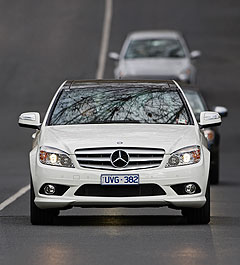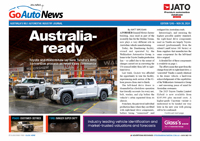Make / Model Search
News - General News - FinanceSenate hears final LCT pleasTaxed: LandCruiser is one of the few Toyotas priced over the LCT threshold. Mercedes proposes carbon tax to replace LCT, as senate committee seeks Bracks view11 Aug 2008 THE last day of the senate hearing into the proposed increase in the luxury car tax (LCT) contained something of a bombshell when Mercedes-Benz presented a clever proposal that would not only raise more money for the government but link it to the environment. Under the proposal, all cars would be taxed according to their emissions, so a $14,000 Hyundai Getz, for example, would cost about $500 more while a Mercedes-Benz E350 – which already contains about $35,000 of taxes in its $135,000 price – would not change. Ford and Toyota also attended last week’s Melbourne hearing of the Senate Standing Committee on Economics, which met in Adelaide and Sydney in previous weeks. The Victorian Automobile Chamber of Commerce (VACC) presented legal advice questioning the right to back-date the proposed LCT increase (from 25 to 33 per cent) to July 1.  Left: Mercedes-Benz C-class. Left: Mercedes-Benz C-class.Committee member Eric Abetz, the shadow industry minister, has spoken out against the review winding up without hearing “critical evidence” from Steve Bracks, who recently presented his overall automotive industry report to industry minister Kim Carr. “Mr Bracks was specifically tasked with examining the luxury car tax in his review, and indeed his interim report flagged reducing the tax, not increasing it,” said senator Abetz. “Yet, despite having the review, Senator Carr is refusing to release it.” Senator Abetz said that senate committee chair Annette Hurley had refused his request to ask senator Carr for a copy of the still-secret Bracks review – or at least the section relating to the LCT. Mercedes’ carbon tax proposal has found an ally in rival BMW Australia, which elected not to present to the senate committee last week but has since told GoAuto that the company supports the concept. “I think the spirit of what Mercedes-Benz has proposed makes sense,” said Toni Andreevski, the communications manager of BMW Australia, which also opposes the LCT outright. “Taxing cars over a certain price doesn’t make sense, especially when the government is advocating free trade.” Mercedes-Benz Australia managing director Horst van Sanden, who presented the innovative ‘carbon tax’ in Melbourne last Wednesday, said this week that he remains opposed in principle to any form of LCT but that the new proposal provides an interesting alternative to consider. Mr van Sanden told GoAuto that the four senators who attended the Melbourne hearing showed genuine interest in the proposal. “Judging by the questions that came from the senators, they seemed to seriously consider what the industry has to say,” said Mr von Sanden. “It was quite an open forum with open questions and serious interest in the issues we raised. “We came up with a proposal that it would be far more reasonable to implement a carbon tax. That’s the issue for the future. Sustainability is probably topic number one and, if the government wants to raise funds, why not combine it with the need to reduce carbon emissions?” The Mercedes proposal would see the luxury car tax phased-out from the current 25 per cent to zero over a five-year period, during which an equivalent carbon tax would be introduced. Between 2009 and 2014 the carbon tax would rise to 25 per cent, but a sliding scale would see the most efficient cars (with less than 119g/km of carbon emissions) attracting no tax at all. The proposal’s author, Mercedes-Benz Australia communications manager David McCarthy, said that the LCT puts Australia's free trade status under threat but that his scheme would make the playing field more level and soundly based. Mr McCarthy said that it recognises the government’s need to raise revenue while going a long way to meeting its Kyoto obligations. “This could be a part of the emissions trading scheme,” said Mr McCarthy. “We haven’t got a lot of time and there are not a lot of options. I’m not saying this is the answer, but it could be part of the solution. “We can solve (emissions and safety issues) with technology, but there has to be a price incentive so consumers accept it.” Mr McCarthy estimates that his scheme would increase government revenue by between $750 million and $2 billion over the LCT in its first year alone – more than enough to cover the government’s $500 million Green Car Fund. The luxury car companies believe that the proposed increase to 33 per cent in the LCT will be counter-productive due to an expected drop in sales of between 10 and 20 per cent in the coming years that would cost the government hundreds of millions of dollars. Mercedes-Benz estimates that a 20 per cent drop in its sales would cost the government $218 million a year, with a similar amount applying to BMW, then proportionately smaller amounts with the other players in the luxury car market. As well as wanting the LCT abolished (because no other luxury goods are similarly taxed) and presenting a carbon emissions-based alternative, Mercedes-Benz also presented the option of raising the current threshold of $57,180 to $95,000. “We certainly don’t accept that $57,000 is an acceptable threshold for a luxury car tax,” said Mr van Sanden. “If you go back and index the LCT from when it was first introduced then it would be about $70,000 today. If you then take into account change in income structures, it should be around $90,000. “Another issue is that one of the reasons why 88 per cent of our cars are over the luxury tax threshold is that we are one of the leaders in safety technology and environmental technology. “We spend $18 million a day on research and development, and that is reflected in the price of our cars, so we tried to explain to them that we see this as a tax on safety and environmental technology.” Read more:LCT battle enters final phaseIndustry states its case to Bracks review Car industry question time |
Click to shareGeneral News articlesResearch General News Motor industry news |









Facebook Twitter Instagram